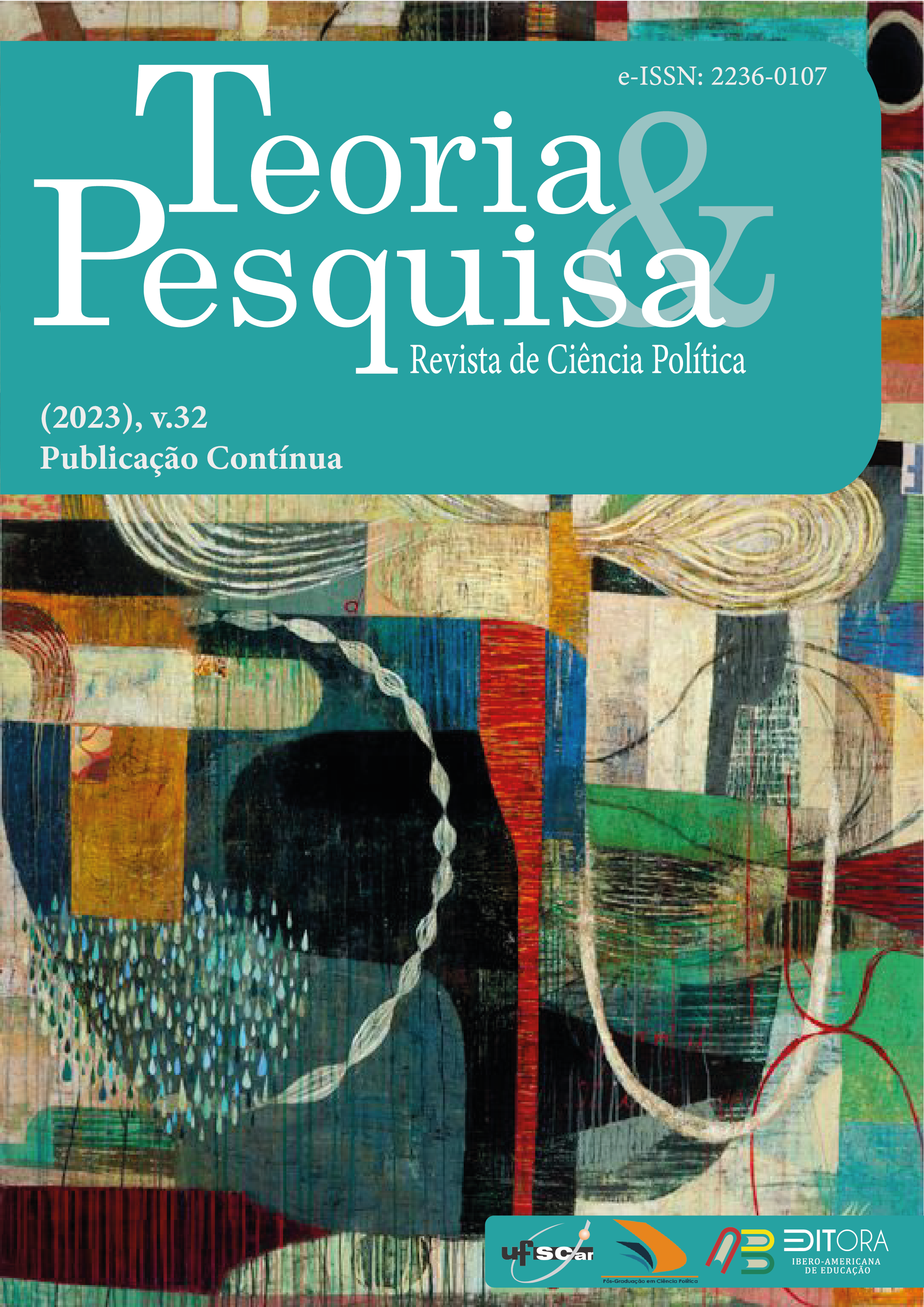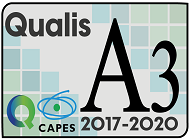From the new edition of designing social inquiry to the reedition of new methodological debates
DOI:
https://doi.org/10.14244/tp.v32i00.1017Keywords:
Political methodology, Methodological debates, Quanti vs. Quali, Causal explanation, KKVAbstract
The article revisits the methodological discussions proposed in KKV's work on the occasion of the publication of a new edition of Designing Social Inquiry. The starting point is KKV's work, which is used to analyse contemporary discussions on causality, explanation and science. The premise is that KKV's inferential logic is projected as a single model for producing knowledge, which contrasts with the plurality of conceptions within Political Science and International Relations. Using the contributions of the philosophy of social sciences to evaluate the work and contemporary debates in both disciplines, three problems in KKV's work are pointed out: the problem of causality, the problem of explanation and the problem of methodological unification. The analysis of these problems highlights the logic of science that KKV projects onto the disciplines of Political Science and IR, summarized in a vision of causality derived from the Rubin-Holland model, centered on causal explanation as the only form of legitimate explanation, and proposed as a universal model for the production of knowledge.
Downloads
References
BELL, M. S. Examining Explanations for Nuclear Proliferation. International Studies Quarterly, [S. l.], v. 60, n. 3, p. 520–29, 2016.
BENNETT, A. Process Tracing: A Bayesian Perspective. In: BOX-STEFFENSMEIER, J. M.; BRADY, H. E.; COLLIER, D. (org.). The Oxford Handbook of Political Methodology. Oxford: Oxford University Press, 2008. p. 702-721.
BENNETT, A. Process Tracing with Bayes: Moving Beyond the Criteria of Necessity and Sufficiency. Qualitative & Multi-Method Research, [S. l.], v. 12, n. 1, p. 46-51, 2014.
BEVIR, M. Meta-methodology: Clearing the Underbrush. In: BOX-STEFFENSMEIER, J. M.; BRADY, H. E.; COLLIER, D. (org.). The Oxford Handbook of Political Methodology. Oxford: Oxford University Press, 2008. p. 48-70.
CARTWRIGHT, N. Hunting Causes and Using Them: Approaches in Philosophy and Economics. Cambridge: Cambridge University Press, 2007.
CARTWRIGHT, N. Causal Inference. In: CARTWRIGHT, N.; MONTUSCHI, E. (org.). Philosophy of Social Science: A New Introduction. Oxford: Oxford University Press, 2014. p. 308-326.
CARVALHO, T.; GABRIEL, J. P. N.; LOPES, D. B. ‘Mind the Gap’: Assessing Differences between Brazilian and Mainstream IR Journals in Methodological Approaches. Contexto Internacional, [S. l.], v. 43, n. 3, p. 461-488, 2021.
CHATTERJEE, A. Ontology, Epistemology, and Multi-Methods. Qualitative & Multi-Method Research, [S. l.], v. 7, n. 2, p. 11-15, 2009.
CHERNOFF, F. Explanation and Progress in Security Studies: Bridging Theoretical Divides in International Relations. Stanford: Stanford University Press, 2014a.
CHERNOFF, F. Causal Argument in IR: Regularity, Singular Cause, and Inefficient Cause. Qualitative & Multi-Method Research, [S. l.], v. 12, n. 2, p. 6-11, 2014b.
COPPEDGE, M. Speedbumps on the Road to Multi-Method Consensus in Comparative Politics. Qualitative & Multi-Method Research, [S. l.], v. 7, n. 2, p. 15-17, 2009.
DOWDING, K. The Philosophy and Methods of Political Science. Londres: Routledge, 2016.
DOWDING, K.; LENINE, E. Models, Conceptual and Predictive: A Response to Johnson’s Models-as-Fables. Perspectives on Politics, FirstView, 2020. DOI: 10.1017/S1537592721002000.
DOWDING, K.; MILLER, C. On prediction in political science. European Journal of Political Research, [S. l.], v. 58, n. 3, p. 1001-1018, 2019.
ELSTER, J. Explaining Technical Change: A Case Study in the Philosophy of Science. Cambridge: Cambridge University Press, 1983.
GERRING, J. Qualitative Methods. Annual Review of Political Science, [S. l.], v. 20, p. 15-36, 2017.
GOEMANS, H. E. Qualitative Methods as an Essential Complement to Quantitative Methods. Qualitative & Multi-Method Research, [S. l.], v. 5, n. 1, p. 11-13, 2007.
GOERTZ, G.; MAHONEY, J. A Tale of Two Cultures: Qualitative and Quantitative Research in the Social Sciences. Princeton: Princeton University Press, 2012.
HAWKESWORTH, M. Contending Conceptions of Science and Politics: Methodology and the Constitution of the Political. In: YANOW, D.; SCHWARTZ-SHEA, P. (org.). Interpretation and Method: Empirical Research Methods in the Interpretive Turn. 2. ed. Londres: Routledge, 2015. p. 27-49.
HEMPEL, C. G.; OPPENHEIM, P. Studies in the Logic of Explanation. Philosophy of Science, [S. l.], v. 15, p. 137-175, 1948.
HOLLAND, P. W. Statistics and Causal Inference. Journal of the American Statistical Association, [S. l.], v. 81, n. 396, p. 945-960, 1986.
ISAACS, J. C. For a More Public Political Science. Perspectives on Politics, [S. l.], v. 13, n. 2, p. 269-283, 2015.
JACKSON, P. T. The Conduct of Inquiry in International Relations. London: Routledge, 2011.
JACKSON, P. T. Making Sense of Making Sense: Configurational Analysis and the Double Hermeneutic. In: YANOW, D.; SCHWARTZ-SHEA, P. (org.). Interpretation and Method: Empirical Research Methods in the Interpretive Turn. 2. ed. Londres: Routledge, 2015. p. 267-283.
JACKSON, P. T. Causal claims and causal explanation in international studies. Journal of International Relations and Development, [S. l.], v. 20, p. 689-716, 2017.
KELLSTEDT, P. M.; WHITTEN, G. D. Fundamentos da Pesquisa em Ciência Política. São Paulo: Blucher, 2015.
KEOHANE, R. O. International Institutions: Two Approaches. International Studies Quarterly, [S. l.], v. 32, n. 4, p. 379-396, 1988.
KEOHANE, R. O. International Relations Theory: Contributions for a Feminist Standpoint. Millennium: Journal of International Studies, [S. l.], v. 18, n. 2, p. 245-253, 1989.
KEOHANE, R. O. Beyond Dichotomy: Conversations Between International Relations and Feminist Theory. International Studies Quarterly, [S. l.], v. 42, p. 193-198, 1998.
KING, G. Restructuring Social Science: Reflection from Harvard’s Institute for Quantitative Social Science. PS: Political Science and Politics, [S. l.], v. 47, n. 1, p. 165-173, 2014.
KING, G.; KEOHANE, R. O.; VERBA, S. Designing Social Inquiry: Scientific Inference in Qualitative Research. Princeton: Princeton University Press, 1994.
KING, G.; KEOHANE, R. O.; VERBA, S. Designing Social Inquiry: Scientific Inference in Qualitative Research (New Edition). Princeton: Princeton University Press, 2021.
KURKI, M. Causation in International Relations: Reclaiming Causal Analysis. Cambridge: Cambridge University Press, 2008.
KURKI, M.; SUGANAMI, H. Towards the politics of causal explanation: a reply to the critics of causal inquiries. International Theory, [S. l.], v. 4, n. 3, p. 400-429, 2012.
KRIPKE, S. Naming and Necessity. Oxford: Blackwell, 1980.
LEBOW, R. N. Constructing Cause in International Relations. Cambridge: Cambridge University Press, 2014.
LENINE, E.; MÖRSCHBÄCHER, M. La iniciativa DA-RT en la ciencia política estadounidense: discursos acerca de una política de transparencia y acceso a datos. Revista Mexicana de Ciencias Políticas y Sociales, [S. l.], v. LXIV, n. 235, p. 109-138, 2019.
LENINE, E.; MÖRSCHBÄCHER, M. Pesquisa bibliométrica e hierarquias do conhecimento em Ciência Política. Revista Brasileira de Ciência Política, [S. l.], v. 31, p. 123-160, 2020.
LIJPHART, A. Comparative Politics and Comparative Method. American Political Science Review, [S. l.], v. 65, n. 3, p. 682-698, 1971.
MEDEIROS, M. A.; BARNABÉ, I.; ALBUQUERQUE, R.; LIMA, R. What does the field of international relations look like in South America? Revista Brasileira de Política Internacional, [S. l.], v. 59, n. 1, p. 1-31, 2016.
MONROE, K. R. (org.). Perestroika! The Raucous Rebellion in Political Science. New Haven: Yale University Press, 2005.
NICOLAU, J.; OLIVEIRA, L. Political science in Brazil: An analysis of academic articles (1966-2015). Sociologia e Antropologia, [S. l.], v. 7, n. 2, p. 371-393, 2017.
PARANHOS, R; FIGUEIREDO FILHO, D. B.; ROCHA, E. C.; SILVA JÚNIOR, J. A.; FREITAS, D. Uma introdução aos métodos mistos. Sociologias, [S. l.], v. 18, n. 42, p. 384-411, 2016.
PATOMÄKI, H. How to Tell Better Stories about World Politics. European Journal of International Relations, [S. l.], v. 2, n. 1, p. 105-133, 1996.
PATOMÄKI, H. Praxis, politics and the future: a dialectical critical realist account of world-historical causation. Journal of International Relations and Development, [S. l.], v. 20, p. 805-825, 2017.
POPPER, K. A Lógica da Pesquisa Científica. 2. ed. São Paulo: Cultrix, 2013.
RAGIN, C. C.; RIHOUX, B. Qualitative Comparative Analysis (QCA): State of the Art and Prospects. Qualitative & Multi-Method Research, [S. l.], v. 2, n. 2, p. 3-13, 2004.
REZENDE, F. C. Fronteira de integração entre métodos quantitativos e qualitativos na Ciência Política comparada. Teoria & Sociedade, [S. l.], v. 22, n. 2, p. 40-74, 2014.
RIHOUX, B. Case-oriented Configurational Research: Qualitative Comparative Analyss (QCA), Fuzzy Sets, and Related Techniques. In: BOX-STEFFENSMEIER, J. M.; BRADY, H. E.; COLLIER, D. (org.). The Oxford Handbook of Political Methodology. Oxford: Oxford University Press, 2008. p. 722-736.
SOARES, G. A. D. O calcanhar metodológico da ciência política no Brasil. Sociologia, Problemas e Práticas, [S. l.], v. 48, p. 27-52, 2005.
SUGANAMI, H. On the Causes of War. Oxford: Clarendon Press, 1996.
SUGANAMI, H. Narrative Explanation and International Relations: Back to Basics. Millennium: Journal of International Studies, [S. l.], v. 37, n. 2, p. 327-356, 2008.
SCHWARTZSHEA, P.; YANOW, D. Legitimizing Political Science or Splitting the Discipline? Reflections on DA-RT and the Policy-making Role of a Professional Association. Politics & Gender, [S. l.], v. 12, n. 3, p. e11, 2016.
SILVA, G. P. Desafios ontológicos e epistemológicos para os métodos mistos na Ciência Política. Revista Brasileira de Ciências Sociais, [S. l.], v. 30, n. 88, p. 115-129, 2015.
TAHKO, T. E. Unity of Science. Cambridge: Cambridge University Press, 2021.
YANOW, D. Thinking Interpretively: Philosophical Pressupositions and the Human Sciences. In: YANOW, D.; SCHWARTZ-SHEA, P. (org.). Interpretation and Method: Empirical Research Methods in the Interpretive Turn. 2. ed. Londres: Routledge, 2015. p. 5-26.
YLIKOSKI, P. Micro, Macro, and Mechanisms. In: KINCAID, H. (org.). The Oxford Handbook of Philosophy of Social Science. Oxford: Oxford University Press, 2017. p. 21-45.
WALDNER, D. Process Tracing and Causal Mechanisms. In: KINCAID, H. (org.). The Oxford Handbook of Philosophy of Social Science. Oxford: Oxford University Press, 2017. p. 65-84.
WIGHT, C. Agents, Structures and International Relations: Politics as Ontology. Cambridge: Cambridge University Press, 2006.
WINCH, P. The Idea of a Social Science and its Relation to Philosophy. Londres: Routledge, 2008.
WINTER, P.; LENINE, E. Survival of the best fit: modelling nuclear proliferation. International Interactions, [S. l.], v. 46, n. 5, p. 832-845, 2020.
WITTENBERG, J. Peril and Promise: Multi-Method Research in Practice. Qualitative & Multi-Method Research, [S. l.], v. 5, n. 1, p. 19-22, 2007.
WITTGENSTEIN, L. Investigações Filosóficas. 9. ed. Petrópolis, RJ: Ed. Vozes, 2014.












